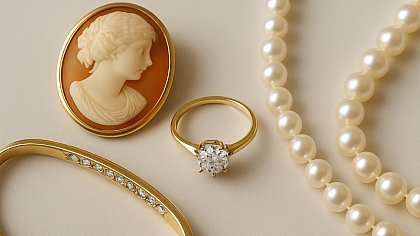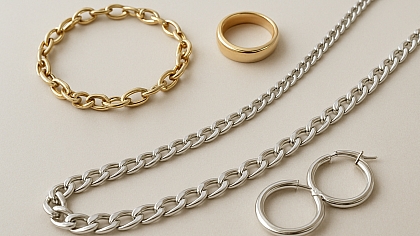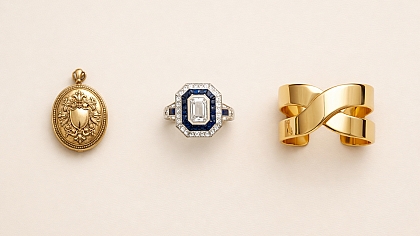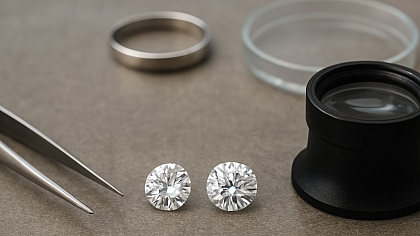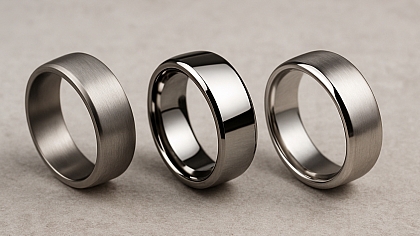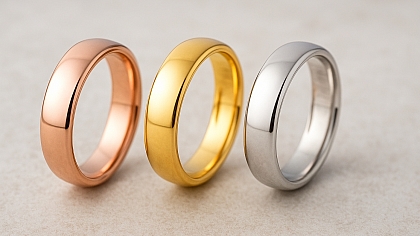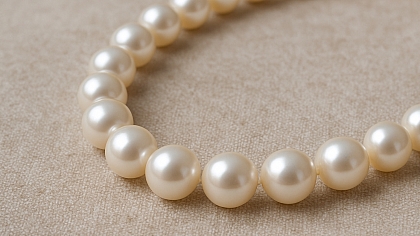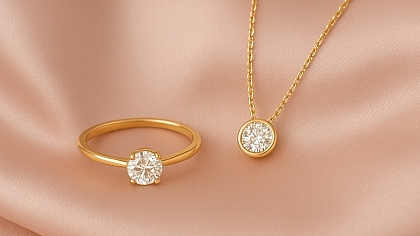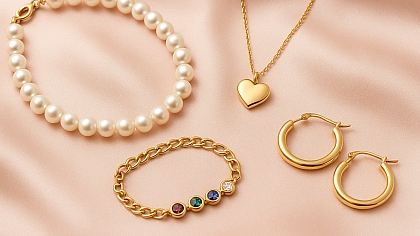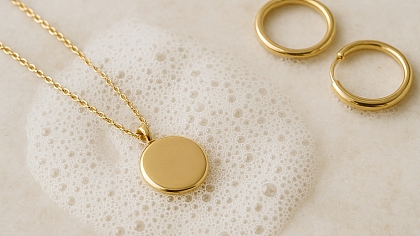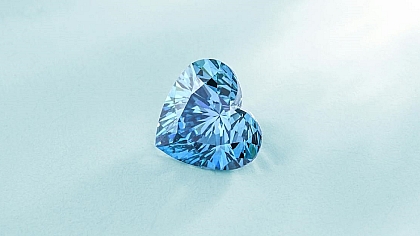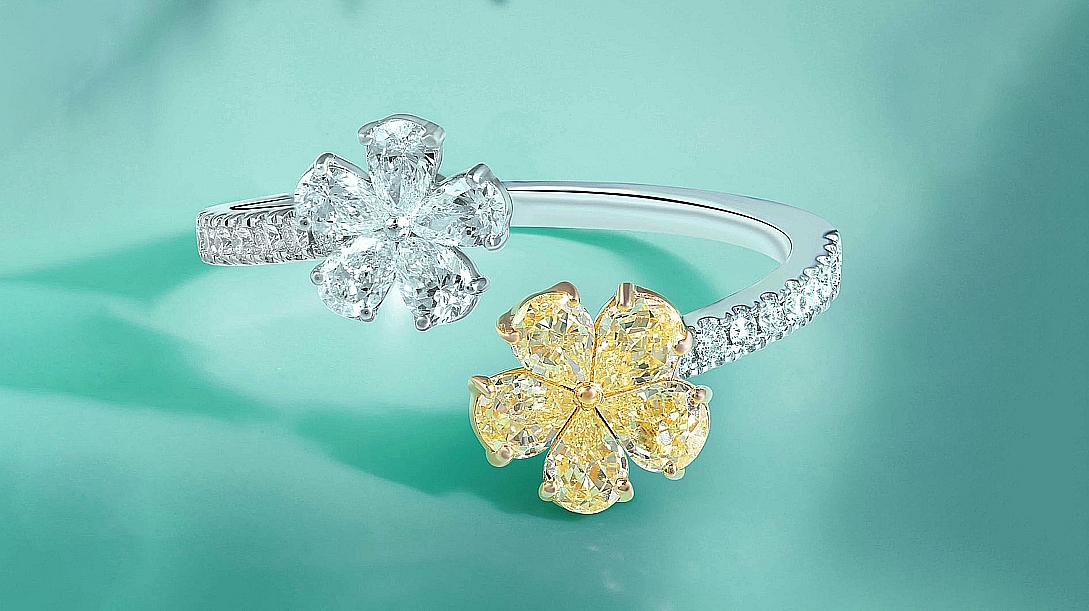
Jewellery Buying: Key Considerations When Purchasing for Yourself
Importance of Personal Jewellery Selection
Buying jewellery for yourself is a deeply personal and rewarding experience. Jewellery is not just an accessory; it is an expression of your individuality, style, and personality. Whether it's a statement piece that draws attention or a subtle addition to your daily wear, the jewellery you choose reflects who you are. Investing in pieces that you truly love and resonate with can bring joy and confidence every time you wear them.
When selecting jewellery for yourself, several factors come into play. From understanding your personal style and setting a budget to choosing the right type of jewellery and ensuring quality, there are many aspects to consider. This guide will walk you through each step, providing insights and tips to help you make informed decisions.
By the end of this guide, you will have a comprehensive understanding of what to look for and how to choose pieces that you will cherish for years to come.
Understanding Your Style
Identifying Your Style: Before making a purchase, it's essential to understand your style. Are you drawn to classic, timeless pieces, or do you prefer contemporary, trendy designs? Do you favour bold, statement jewellery or subtle, minimalist accessories? Reflect on your wardrobe, lifestyle, and the types of jewellery you are naturally attracted to. Consider the colours, shapes, and materials that catch your eye. Understanding your style will help you choose pieces that complement your overall look and feel authentic to you.
Matching Jewellery to Your Wardrobe: Your jewellery should harmonize with your wardrobe. Evaluate the dominant colours and styles in your clothing collection. If your wardrobe consists mainly of neutral tones, you might opt for jewellery with pops of colour to add interest. Conversely, if you wear a lot of vibrant colours, neutral or metallic jewellery can provide a balanced look. Think about the types of outfits you frequently wear, such as casual, professional, or formal, and choose jewellery that will seamlessly integrate into those settings. Versatile pieces that can transition from day to night are particularly valuable.
Setting a Budget
Determining Your Budget: Establishing a budget is a crucial step in the jewellery-buying process. Jewellery can range from affordable to extremely expensive, so knowing your financial limits will help narrow down your options. Consider how much you are willing to spend on individual pieces and your overall budget for jewellery purchases. Remember that higher prices often reflect better quality and craftsmanship, but beautiful, high-quality pieces are available at various price points.
Balancing Quality and Cost: When setting your budget, aim to balance quality and cost. It's worth investing in pieces made from durable materials that will stand the test of time. For example, solid gold or platinum jewellery, though more expensive, will last longer than gold-plated or silver-plated pieces. Similarly, genuine gemstones, while pricier, offer a unique and lasting appeal compared to synthetic stones. Prioritize quality over quantity, choosing fewer, better pieces rather than numerous lower-quality items.
Choosing the Right Type of Jewellery
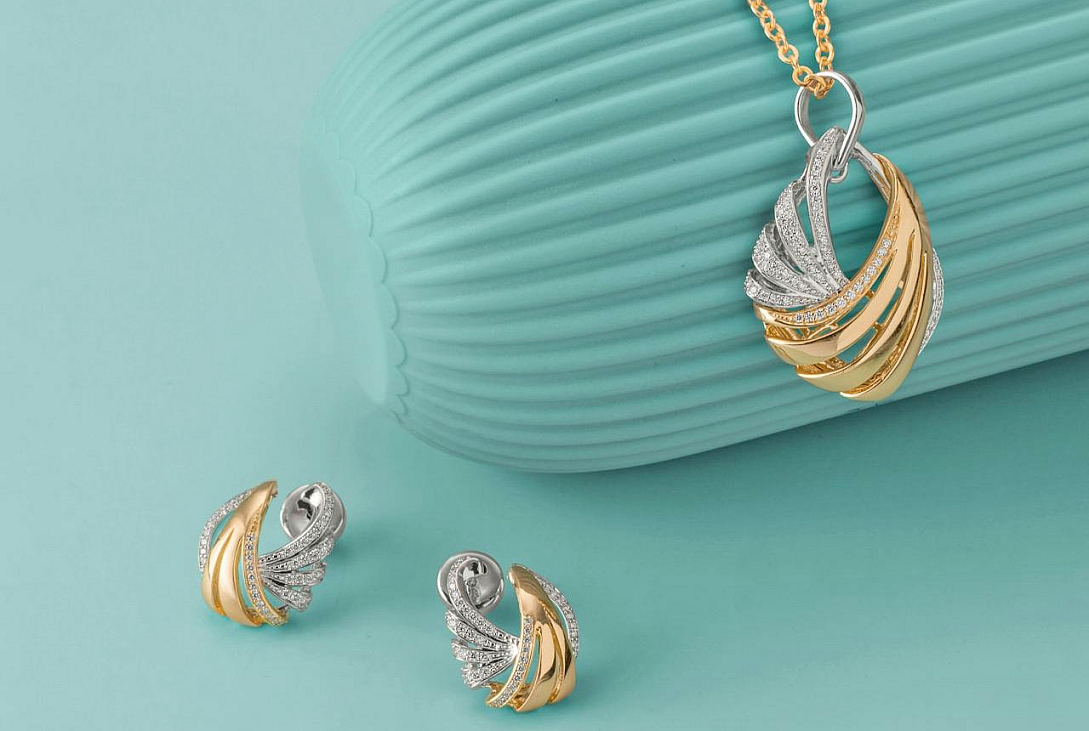
Rings: Rings are versatile and can be worn daily or for special occasions. Consider your lifestyle when choosing rings. For everyday wear, opt for durable materials and simple designs that won't snag on clothing or get in the way. For special occasions, you might choose more elaborate designs with gemstones or intricate details.
Necklaces: Necklaces come in various lengths and styles, from delicate chains to bold statement pieces. When selecting a necklace, consider the neckline of your clothing and the occasion. Shorter necklaces, like chokers and princess-length chains, work well with high necklines, while longer necklaces, like opera or rope lengths, complement lower necklines.
Bracelets: Bracelets add a touch of elegance and can be stacked for a trendy look. Consider the type of bracelet that suits your style, whether it's a simple bangle, a charm bracelet, or a tennis bracelet. Ensure the fit is comfortable and that it won’t interfere with daily activities.
Earrings: Earrings frame your face and can enhance your features. Studs and small hoops are perfect for everyday wear, while larger hoops, dangles, and chandelier earrings are great for making a statement. Consider your face shape and hairstyle when choosing earring styles that will complement your look.
Watches: A watch is both a functional and stylish accessory. When selecting a watch, consider the size, style, and material. Classic designs with leather or metal bands are timeless, while more modern designs with unique features can make a statement. Ensure the watch fits comfortably and suits your lifestyle.
Selecting Materials
Precious Metals: Gold, Silver, Platinum: Precious metals are a cornerstone of fine jewellery. Each metal has its characteristics and benefits:
- Gold: Available in various karats and colours (yellow, white, rose), gold is durable and versatile. Higher karat gold (such as 18k or 22k) is purer and more valuable but softer, while lower karat gold (such as 14k) is more durable for everyday wear.
- Silver: Sterling silver is a popular and affordable option. It has a bright, shiny finish but requires regular polishing to prevent tarnish.
- Platinum: A rare and durable metal, platinum is hypoallergenic and resistant to tarnish. It is more expensive than gold and silver but offers excellent longevity and a beautiful, natural white lustre.
Gemstones: Diamonds, Sapphires, Emeralds, and More: Gemstones add colour and sparkle to jewellery. Each gemstone has unique properties and meanings:
- Diamonds: Known for their brilliance and durability, diamonds are a classic choice for many types of jewellery. They come in various cuts, colours, and clarities, with the 4Cs (cut, colour, clarity, and carat) determining their value.
- Sapphires: Typically blue but available in a range of colours, sapphires are durable and highly prized for their vibrant hues.
- Emeralds: Known for their rich green colour, emeralds are slightly softer than diamonds and sapphires and require careful handling.
- Other Gemstones: Consider other beautiful options like rubies, amethysts, pearls, and more. Each gemstone offers its unique appeal and significance.
Alternative Materials: Stainless Steel, Titanium, and Others: For a modern and often more affordable option, consider jewellery made from alternative materials:
- Stainless Steel: Durable and resistant to tarnish and corrosion, stainless steel is an excellent choice for everyday wear.
- Titanium: Known for its strength and lightweight nature, titanium is also hypoallergenic, making it suitable for those with sensitive skin.
- Others: Materials like tungsten, ceramic, and wood offer unique looks and are often used in contemporary jewellery designs.
Considering Quality and Craftsmanship
Recognizing Quality Craftsmanship: Quality craftsmanship is crucial in ensuring the longevity and beauty of your jewellery. Look for pieces that are well-made with attention to detail. Check for smooth finishes, secure settings, and uniform prongs holding gemstones. Inspect clasps and closures to ensure they are sturdy and function properly.
Certifications and Hallmarks: When buying fine jewellery, certifications and hallmarks assure quality and authenticity. Reputable jewellers will provide certification for diamonds and other precious gemstones, detailing their characteristics and value. Hallmarks on metal pieces indicate the purity of the metal and the maker's mark. These marks are typically found on the inside of rings or the back of pendants.
Evaluating the Occasion
Everyday Wear: When selecting jewellery for everyday wear, consider pieces that are both stylish and practical. Everyday jewellery should be durable, comfortable, and versatile enough to complement a variety of outfits. Opt for designs that are not too bulky or fragile, ensuring they can withstand the rigours of daily activities. Simple stud earrings, thin bracelets, and delicate necklaces are ideal for everyday use. Metals like gold and platinum, and gemstones like diamonds, sapphires, and rubies are excellent choices due to their durability.
Special Occasions: Special occasion jewellery is your opportunity to shine and make a statement. Whether it’s a wedding, gala, or formal dinner, choose pieces that reflect the significance of the event. This is the time to opt for more elaborate designs, larger gemstones, and bolder styles. Statement necklaces, chandelier earrings, and cocktail rings are perfect for special occasions. Consider the dress code and the overall aesthetic you want to achieve. Matching your jewellery to the formality and style of the event can elevate your look and make you feel confident.
Work and Professional Settings: Jewellery for professional settings should strike a balance between elegance and subtlety. Aim for pieces that enhance your professional attire without overwhelming it. Simple and classic designs work best in the workplace. Stud earrings, modest pendant necklaces, and sleek bracelets or watches are appropriate choices. Avoid overly flashy or noisy jewellery that might distract you or others. Stick to pieces that convey professionalism and sophistication, and ensure they complement your business attire.
Assessing Comfort and Practicality
Ensuring a Comfortable Fit: Comfort is key when selecting jewellery, especially for pieces you plan to wear regularly. Rings should fit snugly but not too tightly, allowing for natural swelling of fingers throughout the day. Earrings should not be too heavy, as they can pull on the earlobes and cause discomfort. Necklaces should be the right length for your neckline and not too tight around your neck. Bracelets and watches should fit securely but allow for some movement. Try on different styles and sizes to find what feels best.
Practicality for Daily Wear: Practicality involves considering how a piece of jewellery fits into your daily routine. Think about your lifestyle and activities when choosing jewellery. If you lead an active lifestyle or have a hands-on job, opt for sturdy, low-profile pieces that won’t get in the way or easily damaged. Avoid intricate designs with delicate settings for everyday wear, as they can snag on clothing or objects. Ensure that clasps and closures are secure to prevent loss during your daily activities.
Exploring Custom and Personalized Options
Custom Jewellery Design: Custom jewellery allows you to create a piece that is uniquely yours. Working with a jeweller to design a custom piece gives you control over every aspect, from the choice of materials to the design details. Custom jewellery can commemorate a special event, symbolize personal milestones, or simply reflect your unique style. When designing custom jewellery, consider the craftsmanship, the jeweller's experience, and the cost. Custom pieces often take longer to create but result in a one-of-a-kind piece that you will treasure.
Personalized Engravings: Adding personalized engravings is a meaningful way to make a piece of jewellery truly your own. Engravings can include names, initials, dates, or special messages. They add sentimental value and make the jewellery unique to you. Consider the placement of the engraving and the space available on the piece. Rings, bracelets, and pendants are popular choices for engravings. Ensure that the jeweller has experience with engraving to achieve the desired quality and detail.
Researching and Comparing Retailers
Online vs. In-Store Purchases: Both online and in-store purchases have their advantages. Online shopping offers convenience and a wide selection of jewellery from different retailers. You can compare prices, read reviews, and shop from the comfort of your home. However, it can be challenging to assess the quality and fit of jewellery without seeing it in person. In-store shopping allows you to try on pieces, inspect their quality, and receive personalized service from knowledgeable staff. Consider your preferences and the specific jewellery you are buying when choosing between online and in-store purchases.
Reputable Jewelers and Brands: Buying from reputable jewellers and established brands ensures you receive high-quality jewellery and reliable customer service. Research jewellers by reading reviews, checking their credentials, and looking for certifications such as GIA (Gemological Institute of America) for gemstones. Established brands often have a reputation for quality and craftsmanship. Don’t hesitate to ask questions about the jewellery’s materials, origins, and care instructions. A trustworthy jeweller will provide transparent information and stand behind their products.
Making the Purchase
Tips for a Smooth Buying Experience: To ensure a smooth buying experience, follow these tips:
- Research: Gather information about the jewellery you are interested in, including materials, styles, and prices.
- Ask Questions: Don’t hesitate to ask the jeweller about the piece’s details, including its origin, quality, and care instructions.
- Try Before You Buy: If possible, try on the jewellery to ensure it fits comfortably and looks as expected.
- Read Reviews: Look for customer reviews and ratings to gauge the reputation of the retailer or brand.
- Check Policies: Understand the retailer’s return and exchange policies in case you need to make adjustments or returns.
Understanding Return and Exchange Policies: Before finalizing your purchase, familiarize yourself with the retailer’s return and exchange policies. This is especially important for online purchases where you haven’t seen the jewellery in person. Ensure you know the time frame for returns, any conditions or restrictions, and whether you can get a full refund or store credit. A flexible return policy provides peace of mind and allows you to buy with confidence.
Caring for Your Jewellery
Cleaning and Maintenance: Proper cleaning and maintenance are essential to keep your jewellery looking its best. Follow these tips for different types of jewellery:
- Gold and Platinum: Clean with a mild soap solution and a soft brush. Avoid harsh chemicals that can damage the metal.
- Silver: Use a silver polishing cloth to remove tarnish, and store silver jewellery in airtight containers to prevent oxidation.
- Gemstones: Clean with a gentle soap solution and a soft brush. Avoid ultrasonic cleaners for delicate stones like opals and pearls.
Regularly inspect your jewellery for signs of wear or damage. Loose stones, worn prongs, and broken clasps should be repaired promptly by a professional jeweller to prevent further damage.
Proper Storage Solutions: Proper storage protects your jewellery from scratches, tangling, and tarnish. Here are some storage tips:
- Individual Compartments: Use a jewellery box with individual compartments to prevent pieces from scratching each other.
- Soft Pouches: Store delicate items in soft pouches to protect them from damage.
- Avoid Humidity: Keep jewellery in a cool, dry place to prevent tarnish and corrosion.
- Hanging Storage: Use hanging organizers for necklaces to prevent tangling.
FAQs
1. How can I determine my ring size?
Determining your ring size can be done in several ways. The most accurate method is to visit a jeweller who can measure your finger with a ring sizer. If you prefer to measure at home, use a ring that fits well and measure its inner diameter with a ruler, then compare it to a ring size chart. Alternatively, you can use a piece of string or paper strip to wrap around your finger, mark where it overlaps, and measure the length to find your size using a ring size chart.
2. What is the difference between karat and carat?
Karat (k) is a measure of the purity of gold, with 24k being pure gold. Common purities include 18k, 14k, and 10k, which indicate the amount of gold mixed with other metals to create a durable alloy. Carat (ct), on the other hand, is a unit of weight used to measure gemstones, especially diamonds. One carat is equivalent to 200 milligrams. Both terms are essential in understanding the quality and value of jewellery.
3. Are there any hypoallergenic jewellery options?
Yes, hypoallergenic jewellery options are available for those with sensitive skin or metal allergies. Metals such as platinum, titanium, and stainless steel are excellent choices because they are less likely to cause allergic reactions. Niobium and medical-grade plastic are also good alternatives. When buying hypoallergenic jewellery, ensure it is labelled as such and avoid metals like nickel, which commonly cause allergic reactions.
4. How do I care for my pearl jewellery?
Pearls are delicate and require special care. After wearing, wipe your pearls with a soft, damp cloth to remove oils and dirt. Store them separately from other jewellery to avoid scratches, ideally in a soft pouch or lined jewellery box. Avoid exposing pearls to harsh chemicals, perfumes, or extreme temperatures. For cleaning, use a mild soap solution and a soft cloth, and avoid soaking pearls in water or using ultrasonic cleaners.
5. What should I look for when buying vintage or antique jewellery?
When buying vintage or antique jewellery, consider the following:
- Authenticity: Ensure the piece is genuinely vintage or antique. Look for hallmarks, maker’s marks, and any signs of age or wear that indicate authenticity.
- Condition: Assess the condition of the piece. Check for any damage, repairs, or wear that might affect its durability and value.
- Quality: Vintage and antique jewellery often feature high-quality craftsmanship and materials. Ensure the piece is well-made and the stones are securely set.
- Reputation: Buy from reputable dealers or jewellers who specialize in vintage and antique jewellery. They can provide information about the piece's history and authenticity.
6. Can I resize my ring if it doesn't fit perfectly?
Yes, many rings can be resized, but it depends on the material and design. Simple bands made of gold, silver, or platinum are typically easy to resize. Rings with intricate designs, gemstones, or certain materials like titanium or tungsten may be more challenging or impossible to resize. Always consult a professional jeweller to discuss the feasibility and cost of resizing your ring.
7. How can I tell if a gemstone is real or synthetic?
Determining if a gemstone is real or synthetic can be challenging without professional tools. Here are some tips:
- Certification: Buy gemstones with certification from reputable gemological laboratories, such as GIA or AGS, which verify authenticity.
- Inclusions: Natural gemstones often have inclusions (internal flaws), while synthetic stones are typically flawless.
- Price: If the price seems too good to be true, it might be a synthetic or imitation stone.
- Professional Appraisal: Have the gemstone appraised by a certified gemologist for an accurate assessment.
8. What is the best way to clean my diamond jewellery?
To clean diamond jewellery, use a mild soap solution and a soft brush. Gently scrub the diamond and the setting, especially around the prongs where dirt can accumulate. Rinse thoroughly with warm water and dry with a lint-free cloth. For a deeper clean, you can use a commercial jewellery cleaner specifically designed for diamonds. Avoid harsh chemicals, abrasive materials, and ultrasonic cleaners for fragile settings.
9. How can I keep my jewellery safe at home?
To keep your jewellery safe at home, follow these tips:
- Secure Storage: Use a jewellery box with a lock or a safe to store valuable pieces.
- Insurance: Consider insuring high-value items to protect against theft, loss, or damage.
- Discretion: Avoid leaving jewellery in plain sight or in easily accessible places. Keep your collection discreet to reduce the risk of theft.
- Regular Checks: Periodically check the security of your jewellery storage and update your inventory list for insurance purposes.
10. What should I do if my jewellery breaks or gets damaged?
If your jewellery breaks or gets damaged, take it to a professional jeweller for repair. Avoid attempting DIY fixes, as they can cause further damage. A jeweller can assess the damage and recommend the best course of action, whether it’s soldering broken links, resetting stones, or polishing out scratches. Regular maintenance and professional cleanings can help prevent damage and prolong the life of your jewellery.
By considering these frequently asked questions and the detailed guide provided, you can make informed decisions when purchasing jewellery for yourself.
Whether it's understanding your style, selecting the right materials, or ensuring proper care, these insights will help you build a collection that reflects your personality and stands the test of time. Happy shopping!

